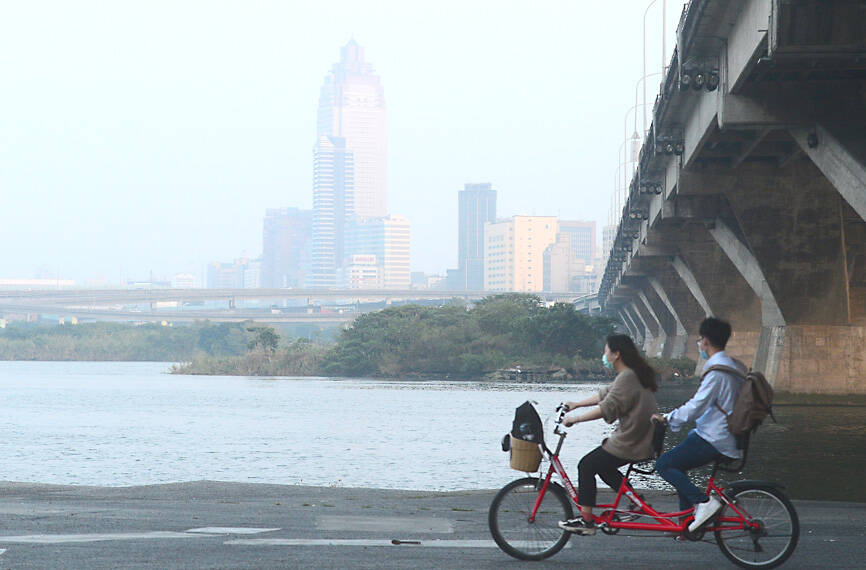The Ministry of Environment yesterday announced more stringent air pollution control zone criteria, meaning that five cities and counties would no longer meet the standard.
Based on the higher standards, New Taipei City, Taichung and the counties of Changhua, Nantou and Chiayi are to be reclassified from “meeting the standard” to “non-compliant” for PM10, the ministry said.
It is part of the ministry’s proposed amendments to the Air Quality Standards first announced in September.

Photo: Wang Yi-sung, Taipei Times
PM10 refers to inhalable particulate matter 10 micrometers or less in diameter found in dust and smoke.
According to the new guidelines, all air quality monitoring stations within a municipality must meet the threshold for particulate matter, rather than the previous system of averaging the results from all stations for a given area.
The stricter criteria means that the five municipalities expand the list of Class 3 zones to 11.
This does not indicate a decrease in air quality for these areas, but reflects the higher standards being used, the ministry said.
On the contrary, the five municipalities have seen decreases in PM10 concentrations in line with the rest of the country since 2016, including a 35 percent reduction for New Taipei City, 36 percent for Taichung, 29 percent for Changhua County, 40 percent for Nantou County and 42 percent for Chiayi County, the ministry said.
For PM2.5, 14 counties and cities remain Class 3 control zones, the ministry said.
For ozone, Yilan, Hualien and Taitung counties are Class 2 control zones, while all other municipalities are Class 3.
The control zone classification allows for local governments to take more proactive measures to control pollution by collecting fees and tightening control of emissions from sources such as construction and road dust, the ministry said.
The higher fees then incentivize businesses to invest in lower-emission or pollution prevention technology, causing air quality to improve further, it added.

‘DENIAL DEFENSE’: The US would increase its military presence with uncrewed ships, and submarines, while boosting defense in the Indo-Pacific, a Pete Hegseth memo said The US is reorienting its military strategy to focus primarily on deterring a potential Chinese invasion of Taiwan, a memo signed by US Secretary of Defense Pete Hegseth showed. The memo also called on Taiwan to increase its defense spending. The document, known as the “Interim National Defense Strategic Guidance,” was distributed this month and detailed the national defense plans of US President Donald Trump’s administration, an article in the Washington Post said on Saturday. It outlines how the US can prepare for a potential war with China and defend itself from threats in the “near abroad,” including Greenland and the Panama

A wild live dugong was found in Taiwan for the first time in 88 years, after it was accidentally caught by a fisher’s net on Tuesday in Yilan County’s Fenniaolin (粉鳥林). This is the first sighting of the species in Taiwan since 1937, having already been considered “extinct” in the country and considered as “vulnerable” by the International Union for Conservation of Nature. A fisher surnamed Chen (陳) went to Fenniaolin to collect the fish in his netting, but instead caught a 3m long, 500kg dugong. The fisher released the animal back into the wild, not realizing it was an endangered species at

The Chinese Nationalist Party (KMT) is maintaining close ties with Beijing, the Democratic Progressive Party (DPP) said yesterday, hours after a new round of Chinese military drills in the Taiwan Strait began. Political parties in a democracy have a responsibility to be loyal to the nation and defend its sovereignty, DPP spokesman Justin Wu (吳崢) told a news conference in Taipei. His comments came hours after Beijing announced via Chinese state media that the Chinese People’s Liberation Army’s Eastern Theater Command was holding large-scale drills simulating a multi-pronged attack on Taiwan. Contrary to the KMT’s claims that it is staunchly anti-communist, KMT Deputy

The High Prosecutors’ Office yesterday withdrew an appeal against the acquittal of a former bank manager 22 years after his death, marking Taiwan’s first instance of prosecutors rendering posthumous justice to a wrongfully convicted defendant. Chu Ching-en (諸慶恩) — formerly a manager at the Taipei branch of BNP Paribas — was in 1999 accused by Weng Mao-chung (翁茂鍾), then-president of Chia Her Industrial Co, of forging a request for a fixed deposit of US$10 million by I-Hwa Industrial Co, a subsidiary of Chia Her, which was used as collateral. Chu was ruled not guilty in the first trial, but was found guilty